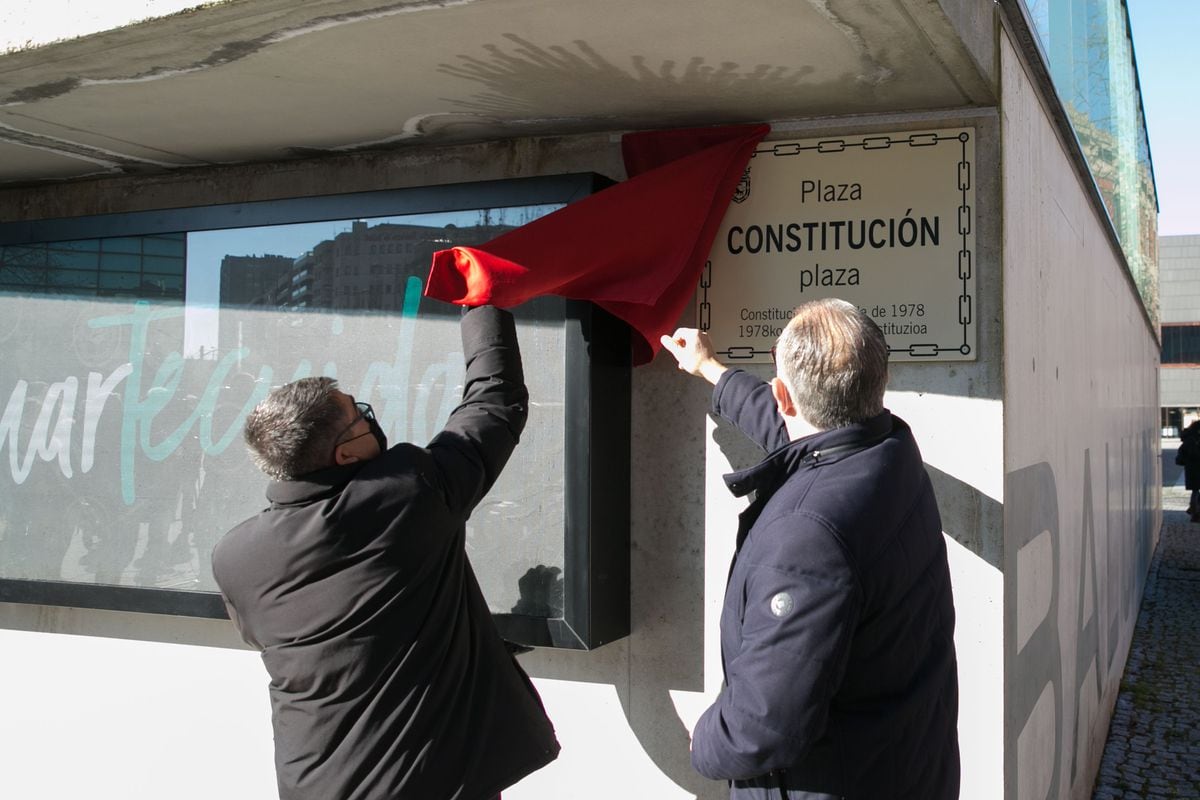Inauguration of the plaque with the name of the Plaza de la Constitución, in January 2022. Cristina Núñez Bauqedano
Pamplona joined many other Spanish cities in January of last year that dedicate a prominent place in their streets to the Constitution.
In the case of the Navarrese capital, moreover, the plaque that marks the place —a pedestrian area that houses the Palacio de Congresos and the Baluarte Auditorium— specifies that the honoree is the Spanish Constitution of 1978. But that plaque is now immersed in a judicial entanglement that will foreseeably have to be resolved by the Superior Court of Justice of Navarra: a judge ruled in January of this year that it was not necessary for the plate to also show the name in Basque, because proper names do not need translation;
but another magistrate has ruled otherwise this Monday, and urges the City Council to put the name in both languages.
The decision of the City Council to label the name of the square only in Spanish —although including in both languages the clarification that it is the Spanish Constitution of 1978— was denounced by nationalist councilors.
The Administrative Court of Navarra (TAN) agreed with these, and the City Council appealed.
But there were two different complaints and the Consistory did not request the accumulation of both, which has given rise to the current mess.
In the resolution notified yesterday, the Contentious-Administrative Court number 2 of Pamplona considers that, according to what is established in the Regulatory Ordinance for the use of Basque in the Pamplona City Council and its institutional public sector, the name of the square must be translated .
His decision thus confirms the resolution of the TAN, which had upheld the appeal of the councilor of EH Bildu Joseba Asiron against the decision of the City Council not to label the denomination in both languages.
The municipal government argued that the name of the square is a proper name that falls outside the translation requirements established by the Regulatory Ordinance for the use of Basque.
This explanation has not convinced the head of the Contentious Court 2 of Pamplona, who makes use of the dictionary of the Royal Spanish Academy (RAE) in his reasoning.
The fourth meaning of this term defines the Constitution as "Fundamental Law of a State, with a higher rank than the rest of the laws, which defines the regime of the rights and freedoms of citizens and delimits the powers and institutions of the political organization", it indicates the judge, for whom the fact that this term (Constitution) is intended to refer to, as is done in the information that accompanies the name of the plate,
to the Spanish Constitution of 1978 does not make it a proper name.
"Note that even this additional information appears on the plate in bilingual (Spanish Constitution of 1978 and 1978ko Espainiako Konstituzioa)," he warns.
“When the Constitution is referred to and it is stated that it is the Spanish Constitution of 1978, it is translated into Basque, while it is argued that a generic element of that denomination (the term Constitution) should not be translated.
It is an argument that cannot be shared ”, concludes the judge, who adds that the rest of the signs on the streets and public spaces in Pamplona confirm his position.
The magistrate cites several cases of denominations with abstract nouns (such as the Plaza de la Libertad, translated on his plaque as Askatasun Plaza);
and remember that the names and surnames of the people who give names to the streets are not translated (as in the cases of Concepción Benítez, Isabel Garbayo Ayala, Adela Bazo or Paulino Caballero), but when the surname of a person is accompanied by a post,
"Constitution is a term that, in accordance with what is established in the already transcribed precepts of the Regulatory Ordinance for the use of Basque in the City Council of Pamplona and its institutional public sector, must appear in bilingual on the label where the denomination appears of the public space, without there being any reason for it not to be so”, the judge settled.
His criteria is opposite to the one established last January by the Contentious-Administrative Judge 1 of Pamplona, who concluded that they should not be translated into Basque
the proper names of streets or squares in the city that have their original name in Spanish or in any other language.
"There are a multitude of names of entities of all kinds that use names from Basque, which are not translated or their spelling is changed when Spanish is used," said the magistrate, who pointed out that, "if the City Council intends to use proper names for denominate public spaces, you cannot alter them to adapt them to the spelling rules of the language that you intend to use”.
Subscribe to continue reading
Read without limits
Keep reading
I'm already a subscriber






/cloudfront-eu-central-1.images.arcpublishing.com/prisa/OWZ46IC2URACHO3QA7VMH4RKLI.jpg)
/cloudfront-eu-central-1.images.arcpublishing.com/prisa/FVTGNSYXBLFXCPTUQ3UJBSUKBY.jpg)

